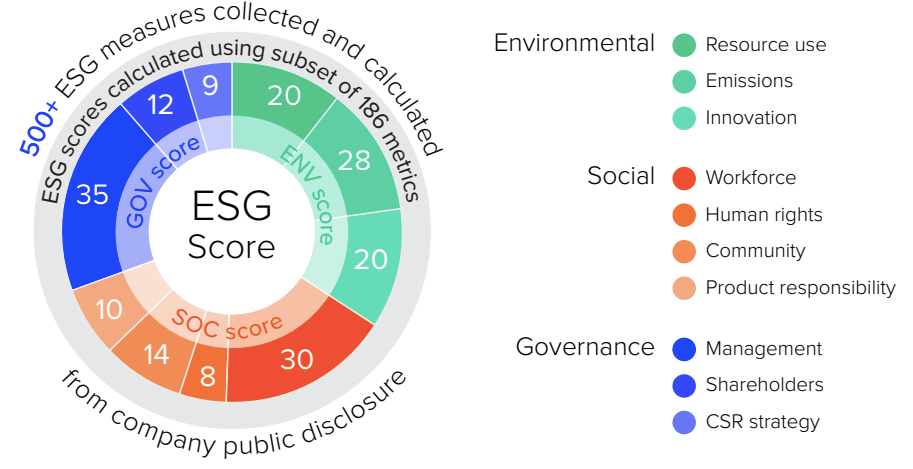ESG stands for Environment, Social, and Governance — standards that companies can use to measure their impact on society and the environment. How to improve ESG scores is one of the goals of every company that wants to outperform the competition.
There are a number of factors that go into calculating a company’s ESG score. These include things like carbon emissions, waste production, employee relations, human rights record, community engagement, and more.
So, how to improve ESG scores if you’re a policymaker?
Table of Contents
What is ESG?
As mentioned earlier, ESG stands for environment, social, and governance. These are the three pillars in measuring the sustainability and ethical impact of an investment.
Environmental factors consider how a company’s practices affect the environment. This includes a company’s carbon footprint, water usage, waste management, and greenhouse gas emissions.
Social factors consider how a company’s practices affect people. This includes a company’s workforce, its customers, and the communities in which it operates.
Governance factors consider how a company is run. This includes a company’s board of directors, its executive compensation, and its shareholder rights.
ESG is important because it allows investors to see beyond a company’s financials to understand its true impact on the world.
ESG investing is a way to align your values with your investments.
There are a number of ways to improve your ESG score.
One way is to invest in companies that have strong ESG practices.
Another way is to vote your shares in support of shareholder resolutions that call for improved ESG practices.
You can also engage with the companies in your portfolio to urge them to improve their ESG practices.
The most important thing you can do is to make sure that you are informed about the ESG factors that are important to you and that you factor those into your investment decisions.
Take Action to Improve Your ESG Rating
Every company has different ways of handling its environmental, social, and governance (ESG) ratings. Some companies take active steps to improve those ratings while others simply rely on the status quo.
There are a number of reasons why a company might want to take action to improve its ESG ratings.
For one, doing so can tell stakeholders that the company is committed to sustainable and responsible business practices. This can help attract and retain customers, as well as attract and retain talent.
In addition, improving ESG ratings can have a positive impact on a company’s bottom line. For example, companies with higher ESG ratings tend to have lower costs of capital, which can save the company money in the long run.
There are a number of steps that companies can take to improve their ESG ratings.
1. Conduct a Materiality Assessment
A materiality assessment is a process of identifying which ESG factors are most relevant to a company’s business and have the biggest impact on its stakeholders.
This information can then be used to develop strategies for improving the company’s ESG performance.
2. Set Goals and Targets
Once a company knows which ESG factors are most important to its business and stakeholders, it can set goals and targets for improving its performance on those factors.
 (Source)
(Source)
3. Implement Policies and Procedures
Once goals and targets have been set, a company can implement policies and procedures to help it meet those goals. For example, a company might develop a policy for reducing its carbon emissions.
4. Monitor and Report Progress
A company should regularly monitor its progress in meeting its ESG goals and report this information to its stakeholders. This will help the company stay accountable and show its commitment to sustainable and responsible business practices.
5. Engage with Stakeholders
A company should engage with its stakeholders on ESG issues. This can help the company understand the concerns of its stakeholders and develop strategies for addressing those concerns.
Be Transparent About Your Efforts to Stakeholders
If you want to improve your company’s ESG score, one key area to focus on is being transparent about your efforts to stakeholders. This means being clear and open about the work you’re doing to improve environmental, social, and governance practices.
How to improve ESG scores?
First, make sure you have a clear and concise ESG policy in place. This will serve as a foundation for all of your transparency efforts.
Once you have your policy in place, start communicating it to your stakeholders. This can be done through a variety of channels, such as your website, social media, and annual reports.
It’s important to be clear and concise when communicating your ESG efforts so that stakeholders can easily understand what you’re doing and why it’s important.
Finally, make sure you’re following up on your transparency efforts. This means regularly reporting on your progress and sharing lessons learned along the way.
By doing this, you’ll not only improve your ESG score but you’ll also build trust with your stakeholders.
Monitor and Adjust as Needed
As someone who is interested in sustainability, you’re always looking for ways to improve your ESG score. And one of the best ways to do that is to constantly monitor your progress and adjust your strategy as needed.
But what does that actually mean?
Basically, you need to keep track of your ESG performance and see where you can improve.
Are you doing well in some areas but not so well in others?
Are there specific areas that you need to focus on?
Once you have a good understanding of where you stand, you can start making changes to your strategy.
Maybe you need to set some new goals, or maybe you need to change the way you’re doing things.
Either way, the important thing is that you’re constantly trying to improve.
Of course, it’s not always easy to make changes. But if you’re committed to sustainability, it’s worth it. Every little bit counts, and you’ll eventually see a difference in your ESG score.
FAQs About How to Improve ESG Score
How can I raise my ESG score?
- Ingrain ESG into your company culture.
- Conduct a materiality assessment.
- Monitor your ratings.
- Follow global frameworks.
- Provide investment-grade data.
What is considered a good ESG score?
Some ESG scoring methodologies give a range from 0-100, with 70 and above considered a good ESG rating and 50 and below considered a bad rating.
Others use a letter-based scoring mechanism with CCC being the worst and AAA being the best.
Conclusion
As a business, it’s important to consider your environmental, social, and governance (ESG) rating. Your ESG rating is a representation of how well you’re doing in terms of sustainability and social responsibility, and it can affect your ability to attract investors and customers.
Following these tips on how to improve ESG scores will make your business more attractive to investors and customers.
{“@context”:”https:\/\/schema.org”,”@type”:”FAQPage”,”mainEntity”:[{“@type”:”Question”,”name”:”How can I raise my ESG score?”,”acceptedAnswer”:{“@type”:”Answer”,”text”:”
- \n\t
- Ingrain ESG into your company culture.\n\t
- Conduct a materiality assessment.\n\t
- Monitor your ratings.\n\t
- Follow global frameworks.\n\t
- Provide investment-grade data.\n
- Ingrain ESG into your company culture.
- Conduct a materiality assessment.
- Monitor your ratings.
- Follow global frameworks.
- Provide investment-grade data. “}},{“@type”:”Question”,”name”:”What is considered a good ESG score?”,”acceptedAnswer”:{“@type”:”Answer”,”text”:”
Some ESG scoring methodologies give a range from 0-100, with 70 and above considered a good ESG rating and 50 and below considered a bad rating.
Others use a letter-based scoring mechanism with CCC being the worst and AAA being the best. “}}]}





